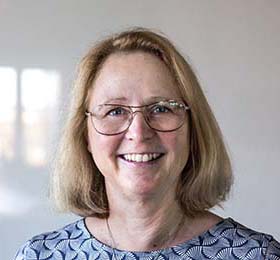
KTH is marshalling its forces within digitalisation
Social robots, always connected cities and smart solution within industry, infrastructure and healthcare. A new research initiative, KTH Digital Futures, brings together multidisciplinary projects to develop future technology for digitalisation.

KTH aims to break new ground in a number of application areas in the development of the digital society. By shouldering a greater social responsibility, the goal is to generate the knowledge that is required for future digitalisation, that impinges upon many industries and sectors.
“We are marshalling our resources to strategically develop cutting edge research. Through our breadth as a faculty of technology with elite research within both the application of digitalisation and associated technologies, we can link together many knowledge areas in order to meet complex social challenges,” says Annika Stensson Trigell , Vice President for Research.
KTH Digital Futures, which will get started properly in the early new year, is being made possible via direct government funding of SEK 78 million a year as part of the government's investment in Strategic Research Areas (SRA).
This long-term direct funding gives us especially big opportunities to formulate fascinating research challenges, she says.
Felt everywhere
“Digitalisation is an area that is felt in all parts of KTH and its subject areas. We are now gaining an opportunity to advance the research frontier and make us even more visible internationally,” says Stensson Trigell who adds:
“The government's investment was announced in earlier budget and research bills but it's only now that we have received confirmation that it is actually going ahead. KTH has been solidly preparing for this since 2018 by inviting many researchers to help define the area and link it to existing initiatives.”
As part of this preparatory work, eight multidisciplinary one-year projects have been started. This has been facilitated by funding from the strategic research area “IT and mobile communication” and also from KTH strategic funds.
These research projects address everything from digital assistants within elderly care and the processing of personal data for smart solutions to water distribution and programmable robotics material on a microscale. Altogether, around 50 research leaders are involved. After pilot phase evaluation, projects can be scaled up to be able to employ postdocs and doctoral students, for example.
“The pilot projects feature an exciting mix of different social problems and interesting technology and solutions, where many leading research groups from vastly different directions within KTH have been linked together,” says Stensson Trigell.
Place for inspiration
KTH Digital Futures should also be a place for smaller projects, courses and inspiration. One important task is to provide opportunities for researchers to test new ideas in meetings with colleagues across subject boundaries.
A meeting place for research into digitalisation will be established on the 2nd floor at the School of Architecture on the KTH Campus. It will be a place where KTH Digital Futures can present what is happening via workshops, exhibitions and offer a forum for researchers and other parties within the area.
Cooperation with external partners, the enterprise sector, authorities and other organisations is determined at project level - a model that enables valuable academic freedom, according to Stensson Trigell.
“Ideas, visions and goals are formulated by the researchers themselves. Hopefully, this can lead to us, together with relevant partners, finding those extra special breakthroughs,” she says.
Text: Christer Gummeson